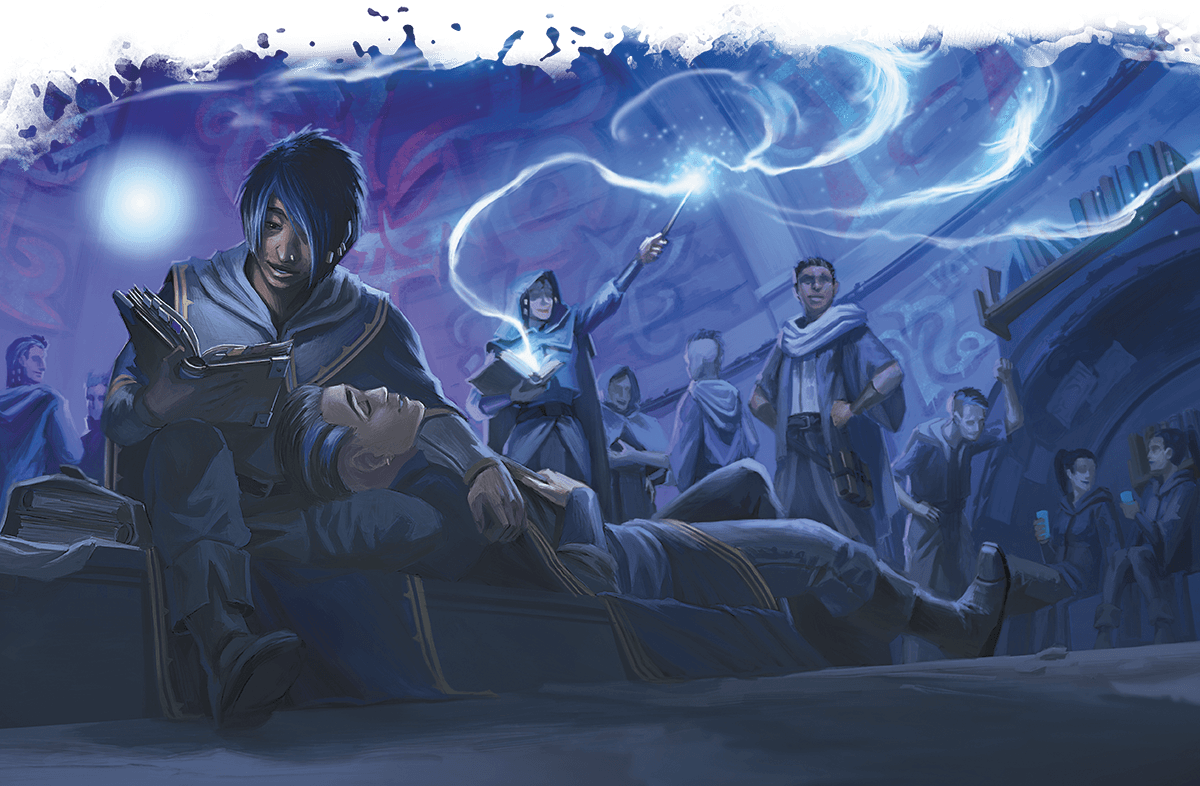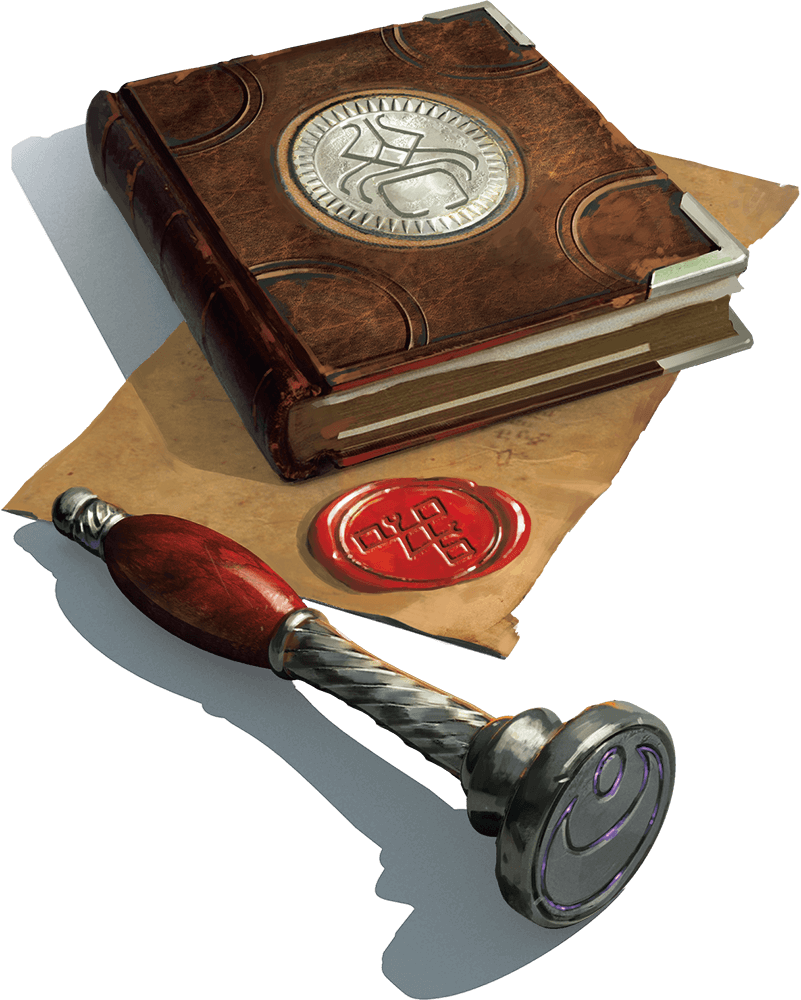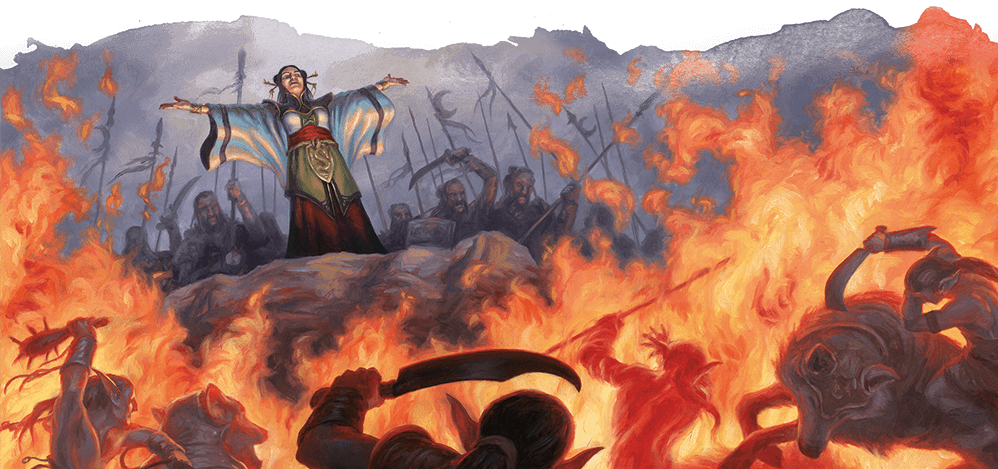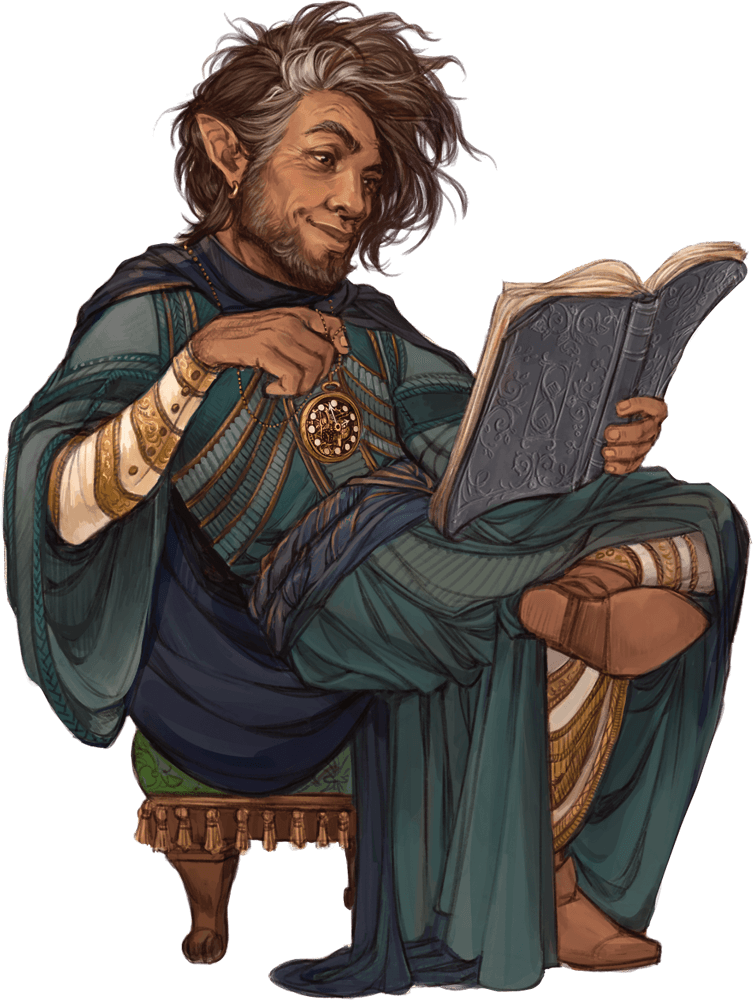“Books are a uniquely portable magic.”
-Stephen King
Wizards are without a doubt the most bookish class in Dungeons & Dragons. While other enchanters might receive their powers from bloodlines and eldritch patrons, wizards fill out their spell slots the old-fashioned way - through careful study and transcription of the printed page.
While there may be flashier schools of wizardry in D&D, if you’re someone who loves the image of an elderly magus who’s so fond of his spell tome that he actually managed to create a spectral version of it to fight alongside him, then a certain Arcane Tradition from Tasha’s Cauldron of Everything is perfect for you - particularly with this week’s release of Candlekeep Mysteries, a collection of adventures featuring the grandest library of the Forgotten Realms as a hub.
In other words, there’s no better time to hit the books and experiment with the Order of Scribes.

Order of Scribes features
Order of Scribes wizards specialize in quickly copying spells into their spellbooks, modifying spell damage types, gaining tactical advantage during combat or exploration, crafting spell scrolls, and surviving lethal blows by sacrificing bits of their magic.
- They gain two level 2 abilities. The first of these, Wizardly Quill, grants the wizard a magical quill that doesn’t require ink and can copy down spells at 2 minutes per spell level. Normally, wizards must spend a whopping 2 hours per level copying a spell, which forces this activity to be done in the downtime before or after a long rest. The Order of Scribes wizard faces no such problem, and could potentially scribble down the most potent magics from an enemy archmage’s stash in the middle of a dungeon crawl while the rest of the party stays alert.
- Their second level 2 feature, Awakened Spellbook, causes a sentience to emerge in the wizard’s spellbook. The wizard can now use the book as an arcane focus and cast spells as rituals using their normal casting time. They can also quickly replace their spellbook after a short rest without spending odious amounts of time and gold. (I played in an Out of the Abyss game with a gnome wizard who lost his spellbook after a drow battle and would’ve killed for this feature.) But the grand slam here is the ability to temporarily replace a spell’s damage type with another you possess that’s of the same level. (So no cantrips allowed.) More on this later, but yes, this does mean that if you cast the level 4 spell Ice Storm and have Sickening Radiance (also level 4) in your spellbook, you can shoot icicles that do radiant damage.
- Manifest Mind is the Order of Scribes level 6 ability. With this, the wizard can summon the mind of their Awakened Spellbook, getting something that’s a cross between a familiar and the Arcane Eye spell that possesses darkvision, can scout up to 300 feet ahead, and is intangible and impervious to damage. (It can disappear if hit with a Dispel Magic spell, though.) Best of all, the wizard can cast spells from the spectral mind’s space a number of times equal to their proficiency bonus. This grants the wizard a tremendous degree of mobility and range, meaning they can certainly bombard a den of undead from 300 feet away with those aforementioned radiant icicles if the occasion calls for it!
- The 10th level Order of Scribes feature is Master Scrivener, which lets the wizard pump out a scroll for level 1 or 2 spells after a long rest like a humanoid printing press. These scrolls are enhanced and count as one level higher than normal when used. Essentially, this gives the wizard a potentially endless array of magics that can be relied upon in a jiffy for the sake of reserving spell slots, and it’s a good idea to make this scroll creation process a daily ritual for any character choosing this Arcane Tradition.
- One With The Word is the final ability obtained at level 14. It grants an advantage on all Intelligence (Arcana) checks and allows the wizard to use a reaction to have their spectral mind absorb all damage from a blow. The mind will immediately vanish, and 3d6 must be rolled in what amounts to a potentially unpredictable outcome where the spellbook will temporarily lose spells of your choice that have a combined level equal to that roll or higher. (For instance, if the 3d6 roll is 6, you could dismiss one 6th level spell, two 3rd level spells, or some other combination.) The lost spells can be cast again once the wizard finishes 1d6 long rests. All in all, One With The Words carries risky consequences, but when you’re hit with a Beholder’s Disintegration Ray, this feature will definitely come in handy.
Benefits of the Order of Scribes
If nothing else, Order of Scribes wizards are versatile. They circumvent several of the busywork restrictions that plague other Arcane Tradition practitioners, such as the hefty time required to copy down new spellbook entries. While they’re not exactly tanks, they can take more than a few hits and remain standing thanks to One With The Word, and their ability to cast magic from afar via Manifest Mind and swap around damage types will surely appeal to D&D tinkerers who love crafting efficient character builds, tactically assessing a battle map and figuring out potent magic combos.
This degree of customization also extends to the Manifest Mind feature, which offers a myriad of roleplaying possibilities. The rules in Tasha’s Guide to Everything state that the mind resembles a ghostly tome, a cascade of text, or a scholar from the past, but generous DMs might be willing to have their players create an appropriate form that ties into a character’s backstory. Perhaps, for example, the mind could take on the appearance of the wizard’s long-departed spouse, representing the eternal connection of two hearts united as one.
Drawbacks of the Order of Scribes
The Order of Scribes tradition has been called niche by some, largely because its skill set is designed to thrive in a campaign that features varied foes with unusual resistances, as well as one that actually follows D&D’s rules when it comes to the time limits required for casting spells as rituals and copying down magic. If your DM is one who handwaves such minutiae, be aware that some of this Arcane Tradition’s more nuanced capabilities may remain on the back burner. If you’re also fearful of temporarily losing spells, the swingy nature of One With The Word may also seem like an underwhelming 14th level ability.
Some D&D fans who keep up with Unearthed Arcana have also critiqued the Order of Scribes as unoriginal, mostly because it’s a remix of a now-scrapped subclass for the Artificer known as the Archivist. Others prefer the more powerful Unearthed Arcana rules for the Order of the Scribes’ Awakened Spellbook, since they enabled players to swap a spell’s damage type with that of any spell in their spellbook - whereas the finalized rules restrict this to a spell of the same level.
Spells
Playing an Order of Scribes mage is all about amassing as many damage types as you can. The Awakened Spellbook text specifically states that you’re allowed to replace a spell’s damage type with one that appears in another spell of the same level, indicating that as long as it shows up in the spell’s text somewhere, you’re good to go. Keeping that in mind, here are some useful loadout possibilities from the Player’s Handbook, Xanathar’s Guide to Everything, and Tasha’s Cauldron of Everything.
As a reminder, D&D’s 13 damage types include acid, bludgeoning, cold, fire, force, lightning, necrotic, piercing, poison, psychic, radiant, slashing, and thunder.
- 1st Level spells: Chromatic Orb (acid, cold, fire, lightning, poison, thunder), Catapult (bludgeoning), Ice Knife (piercing), Magic Missile (force)
- 2nd Level spells: Cloud of Daggers (slashing), Dragon’s Breath (acid, cold, fire, lightning, poison), Dust Devil (bludgeoning), Phantasmal Force (psychic), Shatter (thunder)
- 3rd Level spells: Erupting Earth (bludgeoning), Glyph of Warding (acid, cold, fire, lightning, thunder), Spirit Shroud (cold, necrotic, radiant), Summon Undead (necrotic, poison)
- 4th Level spells: Blight (necrotic), Elemental Bane (acid, cold, fire, lightning), Ice Storm (bludgeoning, cold), Mordenkainen’s Faithful Hound (piercing), Phantasmal Killer (psychic), Sickening Radiance (radiant)
- 5th Level spells: Bigby’s Hand (bludgeoning, force), Cloudkill (poison), Cone of Cold (cold), Dawn (radiant), Enervation (necrotic), Immolation (fire), Transmute Rock (bludgeoning)
- 6th Level spells: Chain Lightning (lightning), Investiture of Flame (fire, cold), Investiture of Stone (bludgeoning, piercing, slashing), Sunbeam (radiant), Tasha’s Otherworldly Guise (fire, poison, radiant, necrotic)
- 7th Level spells: Crown of Stars (radiant), Finger of Death (necrotic), Prismatic Spray (acid, cold, fire, lightning, poison), Whirlwind (bludgeoning)
- 8th Level spells: Feeblemind (psychic), Illusory Dragon (acid, cold, fire, lightning, necrotic, poison) Sunburst (radiant)
- 9th Level spells: Blade of Disaster (force), Prismatic Wall (acid, cold, fire, lightning, poison), Weird (psychic)
This list doesn’t take into account the non-wizard spells and damage types that might become accessible if you’re following D&D’s multiclass rules. (Check out our How to Multiclass for Beginners article for more info!)
Speaking of multiclassing, one combination that’s achieved notoriety on the internet is an Order of Scribes Wizard who takes two levels of Tempest Cleric, giving them the ability to deal maximum Thunder or Lightning damage to an enemy once per short rest via Channel Divinity. Considering the damage swapping capabilities of the Order of Scribes, this could either be a match made in heaven or insanely overpowered, depending on whether you’re a player or a DM!
Feats
To supplement the Order of Scribes’ skillset, consider the following feats, which can add magic from other classes to your disposal without relying upon multiclassing or increase the wizard’s mobility and hardiness.
- Elemental Adept - This feat will let your spells ignore resistance to a certain damage type - acid, cold, fire, lightning or thunder - and also lets you treat any 1 on a damage die as a 2. This can be handy if you need to swap the damage type of a certain spell but don’t have anything prepared in your spell slots that’s of the same level.
- Eldritch Adept - To amplify the versatility of the Order of Scribes wizard, why not dip into the Warlock’s magic pool? Invocations like Eldritch Sight, which lets you cast Detect Magic at will, can be fantastic for conserving spell slots for those big damage swapping attacks that you specialize in.
- Fey Touched - Learning Misty Step for free and an additional 1st level spell - both of which can be cast once per long rest without expending a spell slot - is immensely useful, especially if you decide to use your spellbook’s spectral mind for scouting purposes and need to quickly teleport to its side.
- Magic Initiate - This feat will give you two cantrips from the bard, cleric, druid, sorcerer, or warlock spell lists, and even though cantrips can’t benefit from Awakened Spellbook, they’re still great to have. Plus, you get an extra 1st level spell to go along with them!
- Shadow Touched - Similar to Fey Touched, this lets you learn Invisibility for free and an additional 1st level spell that can be cast once per long rest without expending a spell slot. Imagine staying unseen to all as you unleash your magics from the space of your spectral mind. Who said that wizards can’t act like rogues?
- Telekinetic - This is an interesting choice that gives you an invisible Mage Hand and also lets you telekinetically shove one creature you can see within 30 feet. Once again, this supplements the Order of Scribe’s high mobility and can even serve as a unique way to maneuver allies around the battlefield.
- Warcaster - Warcaster’s just an easy choice for all wizards, letting them have an advantage on Constitution saving throws to maintain concentration and granting the ability to cast a spell as a reaction when attacks of opportunity are provoked.
The Order of Scribes wizard is one who trusts in the power of the book and knows that the quill is mightier than the sword. Consider playing this unique Arcane Tradition in the just-released Candlekeep Mysteries - for who better than a scribe to investigate the enigmas that lurk within mysterious grimoires?
For more on wizards, be sure to check out our overview of wizardly traditions in Wizard 101: A Beginner’s Guide to the Arcane Arts, as well as our in-depth looks at the School of Abjuration and the School of Evocation. And if you’d rather play another class, our entire Class 101 series is at your disposal.
Jeremy Blum (@PixelGrotto) is a journalist, gaming blogger, comic book aficionado, and fan of all forms of storytelling who rolled his first polyhedral dice while living in Hong Kong in 2017. Since then, he's never looked back and loves roleplaying games for the chance to tell the tales that have been swirling in his head since childhood.












-
View User Profile
-
Send Message
Posted Mar 31, 2021Best Wizard ever!! Though I think the author of this article misunderstood master scrivener. The scrolls only last 24 hours, so you can't make an endless supply of them. It basically lets you have an additional level 1 or 2 spell prepared each day that is automatically upcast. It's still a great feature though.
-
View User Profile
-
Send Message
Posted Apr 1, 2021thank you
-
View User Profile
-
Send Message
Posted Apr 1, 2021Staff Changes I think
-
View User Profile
-
Send Message
Posted Apr 5, 2021Thanks for continuing the 101 series and great job with the article!
-
View User Profile
-
Send Message
Posted Apr 6, 2021Great Article
In my opinion, by raw, if the optional 'CANTRIP FORMULAS' is used then damage types can be swapped between cantrips since the spells are written in the spellbook. The only time damage types can be swapped between different classes when multiclassing is when your warlock/mage's Book of Shadows and Awakened Spellbook are the same tome. And then it is only for the cantrips added to the book and the cantrip formulas.
-
View User Profile
-
Send Message
Posted Apr 6, 2021"When you cast a wizard spell with a spell slot, you can temporarily replace its damage type with a type that appears in another spell in your spellbook, which magically alters the spell’s formula for this casting only. The latter spell must be of the same level as the spell slot you expend."
Got any level 0 spell slots?
-
View User Profile
-
Send Message
Posted Apr 8, 2021I CAST FIREBALL BUT HAVE IT DEAL BLUDGEONING DAMAGE!
-
View User Profile
-
Send Message
Posted Apr 8, 2021I’ve got a goodie two shoes nerdy drow from Silverymoon who rocks this class flavor.
-
View User Profile
-
Send Message
Posted Apr 10, 2021Assuming you’re not up casting Fireball, what Wizard spell of 3rd level are you using to get the psychic damage to switch it to?
-
View User Profile
-
Send Message
Posted Apr 10, 2021Doesn't have to be 3rd level -- has to be the level of the spell slot you expend to cast it. If casting fireball as a 4th, 5th, or 6th level spell, for example, you have phantasmal killer, synaptic static, and mental prison, respectively.
-
View User Profile
-
Send Message
Posted May 9, 2021It seems Intellect Fortress covers it, but it's from Tasha's
A bit pricey since it only covers one type, lol.
-
View User Profile
-
Send Message
Posted May 20, 2021Honestly, I love the capacity for multiclassed Order of Scribes characters to have more fluff around it.
A Wizard/Artificer may be essentially "reprogramming" spells on the fly using their gadgets, a wild magic sorcerer could be trying to rein in their chaotic power, Warlocks could be delving further into the secrets of the arcane their Patron doesn't offer them, Bards could be using their instrument to disrupt the flow of a spell and channel it to something more favorable. The possibilities are numerous, if not endless.
-
View User Profile
-
Send Message
Posted May 23, 2021"Ah...let's see what we have here..."
The halfling wizard awkwardly balanced the stack of dusty tomes they had managed to salvage from the lich's private study, a small chamber from down the passage they had just come from. Some of the dense books were slightly singed from a previous encounter...blackened at the edges...but otherwise intact, and the halfling eagerly placed them down on a cleared table to have a closer look.
The small group the wizard counted as their allies sat at the opposite end of the room, taking a brief moment to gather themselves, the warriors sharpening their weapons, while the rogue attempted to coax their cleric friend into a game of cards.
Shutting out their idle conversations, the halfling focused on their task, removing a weathered, leather-bound spellbook from their satchel and placing it upon the table next to the stack. The spellbook quivered with a peculiar vibration, almost imperceptible, and had a curious smell of ozone which surrounded it.
With a flick of their wrist, the wizard conjured a metallic pen into their hand, and opened the pages of the spellbook, before gingerly taking the first of the tomes from off the stack to begin transcribing.
"So do we have anything good this time...?"
The voice was deep, a surly & impatient baritone very different from the halfling's own. Though the voice was loud, none of the other companions in the room seemed to hear it.
"Hush," muttered the halfling absently, who had begun to vigorously copy the contents of the text into the spellbook, their hand a blur of precise & deliberate motion.
"What is this...oh, give me a break! MORE divination spells? They didn't have anything more exciting to write about?!"
The halfling ignored the voice, finishing the last line of text before turning to the next page...which seemed to tug against their fingers with agitation.
"Seriously, what kind of self-respecting lich puts a "Knock" spell in their library...when are we going to get some decent Evocation spells in here?"
"Would you please be quiet?" sighed the halfling, pausing to put their pen down beside the spellbook and rub the bridge of their nose in annoyance.
As if on cue, their came the sudden sound of faint voices outside the room, coming from somewhere further down the corridor.
The wizard's allies stood up from their respite, readying themselves at the source of noise...the clanging of metal, and the angry growls of a group in the distance, growing closer from where the had previously fought.
"Goblins?" asked the rogue, drawing their knives.
"Could be, like before," responded the fighter, readying their shield. She looked back at the halfling wizard, who was placing the tome back on the stack in resignation, a disappointed look on their face.
"You got any more of that firepower left in you?" the fighter asked.
"Yeah, do we?" came the sarcastic voice of the scribe wizard's spellbook again. "Or do we wanna entertain them with some illusory shadow puppets?"
"Fine," said the halfling through gritted teeth, snatching the spellbook off the table.
"Hey! Watch my spine...!"
With a flourish, the wizard waved their hand over the cover of the weather-beaten book. There was a small crackle of sparks, as suddenly the translucent, ghostly image of a dwarven head suddenly manifested in the center of the room.
"Ah...that feels good!" said the floating head, tilting left and right as though popping their non-existent neck.
The rest of the party looked uncertainly at the apparition, still not used to the wizard's incorporeal companion when it decided to show itself.
"Please try to keep the carnage at a reasonable distance this time, please?" the halfling requested, arms folding. "I'd like to keep the blood splatters off the pages."
"Yeah, yeah," said the manifested mind, grinning ear to ear, before floating down the corridor to meet the enemies approaching. "Just wait...I've had this nifty idea to mix the "Fireball" spell with some acid..."
"Just mind the books...!" the wizard called after them, placing their face in their hands, lamenting the centuries-worth of knowledge that was about to be destroyed in the ensuing chaos...
-
View User Profile
-
Send Message
Posted May 25, 2021[Grunkle Stan Voice] Oh, this, this is beautiful.
-
View User Profile
-
Send Message
Posted May 27, 2021I am playing a scribe wizard (archaeologist background) with a few levels of genie patron warlock. Found the vessel (ring) at a dig site and now his wizard's study is the inside of the vessel.
-
View User Profile
-
Send Message
Posted May 27, 2021I have a question regarding this Subclass. How is the gold cost affected with this subclass? With other wizards there is a gold cost of copying spells into your spell book, the cost mostly going towards paper and ink. With the Quill making it's own ink, and the spellbook being sentient and I'm assuming has as much paper as it needs, does this cost still apply? Plus it only takes 10 minutes to make a new of your spellbook into a blank book so long as you use your quill. I always thought of making a new spellbook as copying your spells to a blank book, which costs money.
-
View User Profile
-
Send Message
Posted May 27, 2021Interesting point....
The implication here is that, for every 50 gp you spent initially, 40 gp was for materials consumed in understanding the spell, not the actual process of transcribing it, so you could well argue that it still costs 40 gp per spell level, even with the Wizardly Quill. There is also no indication that the quill helps you to understand the spell, so you could equally argue that it still requires 1 hour and 2 minutes per spell level to transcribe the spell the first time. On the other hand, you get to add two spells to your spellbook every level for free, so there's no need to go overboard. I'd suggest that RAI would be for the process to be free when using the Quill, but you have some leeway if someone figures out a way to abuse it. The DM still ultimately controls which spells you come across while adventuring. ;)
I'm not sure where you get the idea that it only takes 10 minutes to make a new copy of your spellbook, though. "If necessary, you can replace the book over the course of a short rest by using your Wizardly Quill to write arcane sigils in a blank book or a magic spellbook to which you’re attuned." -- In other words, it requires 1 hour and you need to have a blank spellbook on hand (minimum 50 gp investment). Unless you're in the habit of carrying around blank books while adventuring, you'll probably need a trip back to town.
-
View User Profile
-
Send Message
Posted Sep 6, 2021How would the statement "all damage" in invulnerability affect changing the damage type of something like meteor swarm? Also, prismatic wall includes force damage... force meteors!
-
View User Profile
-
Send Message
Posted Sep 6, 2021"All damage" wouldn't really be a type; it's also somewhat questionable whether a protective spell has a damage type in the first place, but rather just a resistance/immunity affecting certain damage type(s), i.e- it's the spells that deal damage that actually have a damage type.
All things Wizards of the Coast really ought to clarify before releasing the content. 😉
-
View User Profile
-
Send Message
Posted Sep 6, 2021You could argue, though, that a spell only has to mention a damage type to allow to use it. if that's the case, would "all damage" allow to choose from any damage type you wanted?